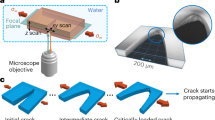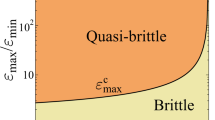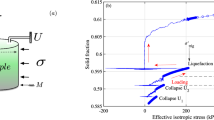Abstract
THE low strength of brittle materials has been ascribed by A. A. Griffith1 to the presence of discontinuities which have the properties of small cracks in these materials. Since this theory was published, however, several investigations have established the fact that glass exhibits the phenomenon of delayed rupture to a marked degree, and this is not easily explicable by Griffith's theory alone. The most recent of these investigations, by F. W. Preston2 in the United States, reports the variation in strength of glass when loads are applied for periods of 10–2 sec. up to 105 sec., the breaking stress falling from 14·3 kgm./mm.2 for 10–2 sec. duration of load to 4·47 kgm./mm.2 for 105 sec. duration.
This is a preview of subscription content, access via your institution
Access options
Subscribe to this journal
Receive 51 print issues and online access
$199.00 per year
only $3.90 per issue
Buy this article
- Purchase on Springer Link
- Instant access to full article PDF
Prices may be subject to local taxes which are calculated during checkout
Similar content being viewed by others
References
Griffith, A. A., Phil Trans. Roy. Soc., A, 221, 163 (1920).
Preston, F. W., J. Appl. Phys., 13, 623 (1942).
Scott Blair, G. W., Nature, 152, 412 (1943).
Author information
Authors and Affiliations
Rights and permissions
About this article
Cite this article
MURGATROYD, J. Mechanism of Brittle Rupture. Nature 154, 51–52 (1944). https://doi.org/10.1038/154051a0
Issue Date:
DOI: https://doi.org/10.1038/154051a0
Comments
By submitting a comment you agree to abide by our Terms and Community Guidelines. If you find something abusive or that does not comply with our terms or guidelines please flag it as inappropriate.



